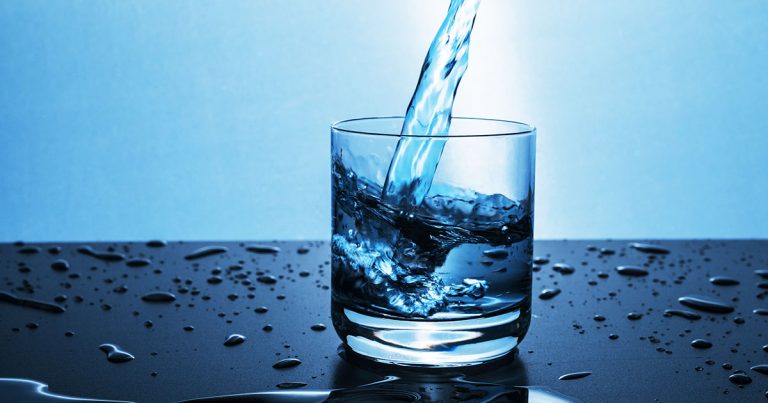How much water should a singer drink? Line Hilton and Alexa Terry take a deep dive into the research on singing and hydration.
Hydration is a holy grail in vocal health – and rightly so. But how much of the advice singing teachers give their students is based on science?
In the first of a two-part series, BAST Training explores why hydration is so important for professional voice users, and how singers can ensure their voice is hydrated optimally?
Topical and systemic hydration
Nothing that we eat or drink directly touches the vocal folds, meaning water consumption won’t instantly hydrate the voice. If a biscuit crumb or a shot of orange juice ‘goes down the wrong way’, we’re likely to be sent into a series of splutters as our body tries to protect the airways from these foreign objects. Vocal fold hydration is reliant on ‘topical’ and ‘systemic’ hydration.
Topical hydration
The word ‘topical’ means ‘on the surface of’. It is the act of swallowing that creates topical hydration for the vocal folds. When we swallow, the larynx rises, pushing and spreading mucus over the surface of the vocal folds.
Systemic hydration
Systemic hydration occurs when we consume water orally, and it is absorbed at the body’s cellular level; this includes the cells of the vocal folds. Hydration is not instant; it is said to take between one and three hours. While we don’t know exactly where the vocal folds are listed on the hydration delivery route, they probably aren’t a priority; the brain and other vital organs are likely to be hydrated first.
Singing and hydration: How does it benefit the vocal folds?
Hydration:
- Improves vocal health maintenance.
- Creates a wetter surface for the vocal folds to slide over.
- Supports flexibility.
- Contributes to a reduction in effort. As singers, our goal is to communicate a message with maximum efficiency but minimum effort. Staying well-hydrated can contribute to this as it reduces the phonation threshold pressure (PTP).
What is PTP?
PTP is the minimum amount of lung pressure needed to keep the vocal folds vibrating at any pitch. Suppose the mucus hanging around the vocal folds is thick due to a lack of hydration. In that case, a singer will need to increase lung pressure to maintain sufficient vocal fold vibration, which may lead to more effort during singing resulting in vocal fatigue.
With a well-hydrated voice, the mucus will be thinner, meaning the singer will require a lower lung pressure to begin and sustain vocal fold oscillation. As a result, the singer is likely to experience improved vocal quality and flexibility, especially when working in the upper ranges.
How much water should a singer drink?
The ‘eight glasses of water a day rule’ is a staple in popular belief, but you may be surprised to know that there is no scientific support regarding this advice.
Renal physiology expert Heinz Valtin states: “I have found no scientific proof that we must ‘drink at least eight glasses of water a day, nor proof, it must be admitted, that drinking less does absolutely no harm. However, the published data available to date (2002) strongly suggests that, with the exception of some diseases and special circumstances, such as strenuous physical activity, long airplane flights, and climate, we probably are currently drinking enough and possibly even more than enough.”
Further reading: Drink at least eight glasses of water a day. Really? Is there scientific evidence for 8×8? Heinz Valtin for the American Physiology Society; 2002.
In the Vocal Health First Aid Course by Vocal Health Education (read our review here), classical singer and nutritionist, Duncan Rock, says that it’s not possible to give a definitive answer as to how much water we should drink every day. There are so many individual factors that influence hydration, including climate and how physically active a person is.
Recommendations
The European Food Safety Authority says the adequate intake of water for a woman is 2L a day, and 2.5L for a male (this includes fruits and vegetables, and all types of drinks).
The NHS recommends six to eight glasses of water per day.
Rock suggests we drink 1ml of fluid per calorie burned, or 100-150ml per hour to account for fluid lost due to expiration or physical exertion.
Dr Mark Porter explored the issue of hydration when he interviewed a range of medical and health experts for the BBC Radio programme Case Studies. The overarching view of his interviewees was that the optimum amount of water we should drink varies from person to person and the circumstances.
Are you getting enough?
Nutrition scientist Bridget Benelam says you can check if you’re adequately hydrated by looking at your urine; it should be a pale straw colour. Urine darker in colour indicates that you’re under-hydrated, while a clearer colour suggests that you’re over hydrated.
Does it have to be water?
No. Fruits and vegetables, non-water drinks, and even that steaming cup of caffeine you start the day with will contribute to your daily water intake.
Many singers believe that caffeine has a negative impact on vocal health because it is dehydrating. Rock busts that myth in his Vocal Health First Aid lectures. Caffeine is a mild diuretic, meaning it causes an increase in urination. But we also need to consider that caffeinated coffee and tea are water-based drinks, so they will contribute to our hydration levels.
Depending on the strength of the caffeine you’re drinking, you’ll need more than five cups a day before the diuretic effect comes into play. Espresso lovers will need to counterbalance the lack of fluid when drinking this beverage.
In their systematic review of the effects of caffeine on the voice Georgalas, V. L. et al. concluded, “The findings of the present review cannot provide robust evidence regarding the effects of caffeine on voice-related measures. Since no firm conclusions can be elicited to guide clinical practice, clinicians should be cautious when recommending caffeine abstinence to patients.”
Alcohol, particularly anything stronger than standard strength beer, is also a diuretic; this is why you get that hangover headache – you’re dehydrated. It’s best to limit alcohol intake or compensate with non-alcoholic, low sugar fluid between tipples.
Share your views on singing and hydration on the BAST Trainers Facebook group.
References
Alves, M., Krüger, E., Pillay, B., van Lierde, K., & van der Linde, J. (2019). The Effect of Hydration on Voice Quality in Adults: A Systematic Review. Journal of Voice: official journal of the Voice Foundation, 33(1), 125.e13–125.e28. https://doi.org/10.1016/j.jvoice.2017.10.001
Franca, M. C., & Simpson, K. O. (2012). Effects of Systemic Hydration on Vocal Acoustics of 18- to 35-Year-Old Females. Communication Disorders Quarterly, 34(1), 29–37. https://doi.org/10.1177/1525740111408886
Hartley, N. A., & Thibeault, S. L. (2014). Systemic hydration: relating science to clinical practice in vocal health. Journal of Voice : official journal of the Voice Foundation, 28(5), 652.e1–652.e20. https://doi.org/10.1016/j.jvoice.2014.01.007
Georgalas, V. L. et al. (2021) The Effects of Caffeine on Voice: A Systematic Review, Journal of Voice. doi: 10.1016/j.jvoice.2021.02.025.
How much water should we drink? Case Studies BBC Radio 4, 18 May 2010, 16:30 https://www.bbc.co.uk/sounds/play/b00scvy3
Popkin, B. M., D’Anci, K. E., & Rosenberg, I. H. (2010). Water, hydration, and health. Nutrition reviews, 68(8), 439–458. https://doi.org/10.1111/j.1753-4887.2010.00304.x




